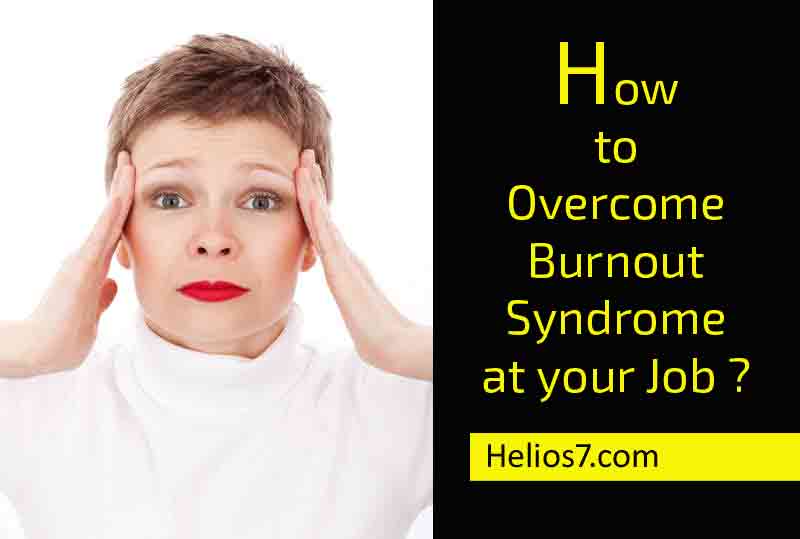How to Overcome Burnout Syndrome at your Job ?

Burnout Syndrome, Occupational Wear Syndrome, Worn Worker Syndrome, Burned Worker Syndrome, Burned Head Syndrome or just work stress. The Burnout has many names and many forms, but always ends with the same result: workers exhausted physically and emotionally, devalued and without courage. In fact, the original name comes from the English term “Burn out,” and translates as “being burned.”
DOES YOUR JOB OVERWHELM YOU? FIND ANOTHER! JOB
Burnout Causes,Symptroms and Treatments
The psychiatrist Herbert Freudenberger was the first theorist to create a definition similar to the one we nowadays handle. In the mid 70’s this professional referred to a psychiatric pathology present in a group of workers, causing depressive states, anxiety crisis, work demotivation, loss of energy and even aggression with colleagues.
What are the consequences of Burnout?
Physical and mental exhaustion, anxiety, nervousness, low tolerance for frustration, aggressiveness. Feeling of failure, impotence, low self-esteem, difficulty concentrating.
Insomnia, headaches, tachycardia, irritability.
For several years, different currents of Psychology have been dedicated to studying the causes and consequences of Burnout, in an attempt to end this problem that affects thousands of workers every year. In that process, they have identified 12 previous phases that lead to a virtually irreversible state of labor exhaustion.
These phases are slow but continuous, and gradually consume the energy of the worker causing him to suffer more and more to the point of not being able to control his anxiety. In extreme cases it can result in permanent damage to worker’s environment, ruining his working life and at the same time affecting his personal life.
Because each case is different, it is impossible to say that these phases will be in order, or even that these always present themselves. In some cases, the workers move from an initial annoyance to a state of sadness and exhaustion too fast, without going through so many intermediate stages. For some workers, the solution will be to take a couple of days off, while others will need more time to disconnect or even stop working altogether, so these stages simply work as a kind of theoretical framework that indicates what can be expected of a Burdened or burned worker.
Therefore, we want you to know them so you can avoid them or recognize them before they continue to advance, but do not wait to go through each of these stages to take action and stop the progress of Burnout. If you feel that you are going through any of these phases, it is best that you seek the help of a Psychologist and start facing your problem from the very root.
– PHASE 1: Lack of Value
You feel that nothing you do is enough, that no one recognizes you. That’s why you begin to show yourself what you are capable of achieving; you seek to demand more and more in the hope that someone will notice how hard you work.
– PHASE 2: Overwork
Your journey is no longer than 8 hours and goes on for an indefinite duration, not by company demand and even many times without order from a superior. Disconnecting from work and using your free time for personal activities seems impossible, and instead, you stay permanently attached to the office. Whether it’s always open mail when you’re at home or even on weekends, or staying longer than you should at your place of work, you just can not stop working.
PHASE 3: You stop importing
Your basic needs pass to a second or third place, after what your boss needs, your company or just your projects. You sleep less, you abandon your social life and even your lunch break, and you are satisfied with just a snack that allows you to stay in front of the computer to use until the last possible moment of the day to work.
PHASE 4: You have no problems
Ignore your problems, make sure they are not there, either because you do not want to solve them or because they do not seem as important as your work. The problem is that, although it is not the most pleasant, we all have problems. Doing as they do not exist does not eliminate them, it only puts them off and makes them more difficult to solve.
PHASE 5: Your limits disappear
Before your hobby was to run, now it is to work, and in fact, you like it so much to do that you spend more and more hours of your day to work. Your loved ones, your values , and hobbies no longer exist, and the boundaries between work and leisure are non-existent.
PHASE 6: Ogre (Devil) replaces you
It’s not you anymore; now it’s an ogre that answers all your companions. The bad mood escapes through the pores, you begin to blame others of your problems and failures, your intolerance grows, and you can no longer live with anyone because you see everyone as inferior.
PHASE 7: You live to work
If you had little social life, for now, you no longer have it. However, you start to miss it a little, and to compensate for falls in bad habits to the point of beginning to affect your health. This point is critical, as well as marking the arrival of a worn out psychological state is beginning to evidence an inevitable physical damage.
PHASE 8: Change of identity
Those around you no longer know you, your behavior is strange for all your environment, but your concern does not have a greater effect on you. You begin to think that they are wrong, that they exaggerate and even speak of another person.
PHASE 9: Nothingness
Nothing matters to you, nothing affects you, you see nothing value. Some experts point out that this phase can already be identified as a state of labor exhaustion, but others point out that the worker must still live certain processes before considering that he is burned.
PHASE 10: The vacuum
You feel incomplete, nothing you do is enough, and your job no longer fills you up as before. From your point of view, nobody values what you do, your partners are a disaster, everyone worries for no apparent reason and try to limit your growth.
PHASE 11: Depression
At this point you are depressed, you do not see the light at the end of the road nor do you think that something productive can come out of your work. Everything seems useless, to the point that you do not want to strain even a little because you know it will not have any positive effect.
PHASE 12: Hell
You are not simply burnt; you are directly burning in hell. Your mind collapses, and you fail to understand why you came to this point when all you wanted was to work and demonstrate your abilities. Even if it’s hard for you to see it, you need professional help urgently.
How to avoid Burnout?
The key is to know how to react in time and recognize the limits. Sometimes it’s okay to feel a bit unmotivated or bored at work, and it’s even normal to do it when we do not have growth opportunities. But knowing the point where that feeling stops being healthy to begin to be harmful is what will make the difference between a healthy worker and a burned.
If you feel that you are exhausting, it is best to ask for a few days of leave, and if you do not have that possibility put your maximum effort in using every free moment to distract yourself and forget all those negative feelings that are generated in the office. If it does not work, it’s time to stop acting on your own, and you dare to seek the help of a professional.



